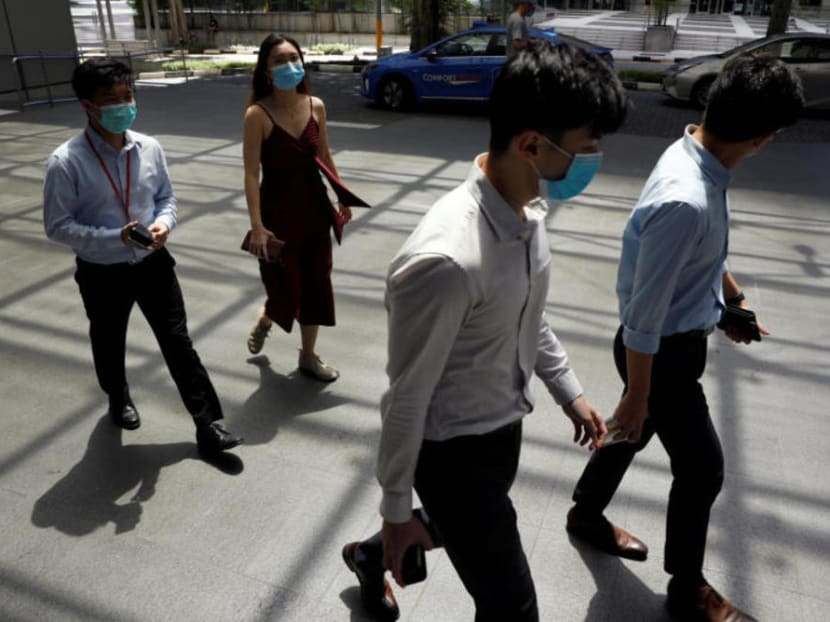Concerns about competition for jobs from foreigners dominate first day of parliamentary debate on President’s Address
SINGAPORE — The issue of foreigners competing for jobs with Singaporeans was a recurring theme as Members of Parliament (MPs) on Monday (Aug 31) launched into the first parliamentary debates since the General Election in July.

A recurring theme among MPs in Parliament on Aug 31, 2020 was the concern among Singaporeans over foreigners competing for jobs.
- Competition between locals and foreigners for jobs was raised by Members of Parliament (MPs)
- MPs said that while Singapore needs to stay open to tap the skills of foreign workers, locals’ jobs must be protected
- MPs suggested tackling unfair hiring, nurturing skills among local workers and nudging Singaporeans into less popular sectors
SINGAPORE — The issue of foreigners competing for jobs with Singaporeans was a recurring theme as Members of Parliament (MPs) on Monday (Aug 31) launched into the first parliamentary debates since the General Election in July.
Fifteen of the 19 MPs and political office holders who debated the President’s Address touched on concerns raised by Singaporeans over missing out on jobs to foreigners during this period of economic crisis.
A common refrain among the MPs was that while Singapore needs to stay open to tap the skills of foreign workers, efforts must also be made to protect the jobs of locals.
Among those who emphasised the need for Singapore to keep an open market was Leader of the Opposition Pritam Singh.
The Workers’ Party (WP) MP for Aljunied Group Representation Constituency (GRC) called the country’s open borders “a fact of our life”.
“Opposition politics and advocacy for Singaporeans cannot ignore Singapore’s place in the world and what we offer to the world,” he said.
“We must still look outward even as we continually search for a lasting modus vivendi (mode of living) which accommodates the domestic pressures of being economically open and the reality of a Singapore identity that evolves and crystalises as our nation matures.”
With the expansion of business needs driving the demand for workers with specialised skills, such as in artificial intelligence, Mr Patrick Tay, MP for Pioneer Single Member Constituency (SMC) and assistant secretary-general of the National Trades Union Congress (NTUC), said that Singapore “should not close its doors”.
Instead, it should hire foreign professionals, managers and executives to maintain Singapore’s economic competitiveness until locals could be trained.
Citing examples of other countries which had recently imposed restrictions on skilled migrants, Mr Ang Wei Neng, MP for Jurong GRC, said that Singapore needs to stay competitive even in a world which is becoming inward-looking as such an approach here could be detrimental to the Republic’s prospects.
OBSTACLES FOR SINGAPOREANS IN SECURING JOBS
Nevertheless, MPs acknowledged that while Singaporeans could hold positions currently held by foreigners, they faced obstacles.
Questioning if it had become “too easy” for foreigners to work in Singapore, Mr Ang said that he felt that Singaporeans were capable of filling in regional or senior management positions currently held by expatriates.
Ms Foo Mee Har, MP for West Coast GRC, also raised concerns over incidents of unfair employment practices faced by Singaporeans.
“Many Singaporeans believe that they are being passed over for jobs that they can do because foreigners come cheaper, without the employer having to pay for Central Provident Fund contributions and deal with National Service obligations, or simply because employers prefer to bring their own friends and families from overseas to fill vacancies,” she said.
Mr Melvin Yong, MP for Radin Mas SMC, also warned that with remote working becoming the norm, competition for jobs between locals and foreigners will intensify.
He questioned the relevance of the work pass and Employment Pass system in an environment where companies no longer require the physical presence of employees in one location.
In this regard, Singaporeans will have to be more resilient and nimble to respond to change and thrive in the global environment, said Mr Yong who is also NTUC assistant secretary-general.
TACKLING UNFAIR HIRING AND ENCOURAGE LESS POPULAR JOBS, SUGGEST MPS
To protect the local workforce, MPs suggested tackling unfair hiring practices, nurturing skills to suit the demands of the economy and nudging Singaporeans into less popular sectors.
Mr Singh called for tougher measures against those engaging in unfair hiring practices. His proposals included publishing the names of recalcitrant employers, passing anti-discrimination legislation and requiring all Employment Pass and S-Pass applicants to have their educational credentials assessed at their own expense.
Mr Ang suggested the formation of a national human resource committee which would, among other duties, hold regular meetings with the head of human resources at major companies in Singapore to understand their manpower needs.
With Government subsidies available for training, Ms Jessica Tan, MP for East Coast GRC, urged employers to invest and develop the skills of Singaporeans and to have succession plans in place.
Ms Gan Siow Huang, Marymount SMC MP, said that to reduce the reliance on foreign labour, sectors dominated by them would have to appeal to Singaporeans first.
Ms Gan, who is also the Minister of State for Education and Manpower, cited the example of how the shifting of construction work to off-site automated production facilities has created roles such as production managers and quality assurance personnel.
Such opportunities offer a better work environment for local professionals, managers, executives and technicians, and help to reduce the reliance on foreigners, noted Ms Gan.
Mr Saktiandi Supaat, MP for Bishan-Toa Payoh GRC, also suggested that those from the lower-income group who had lost their jobs be directed to sectors less popular among Singaporeans such as nursing and early childhood education through a structured job reallocation programme.











